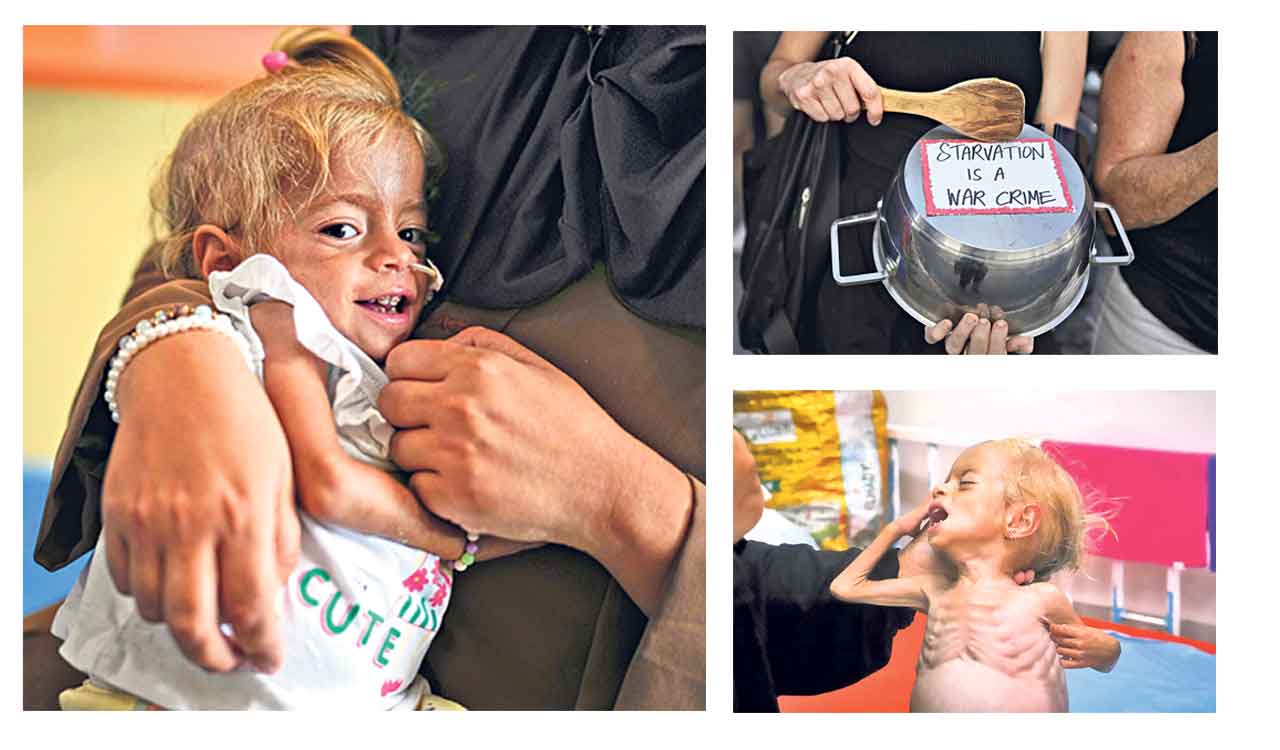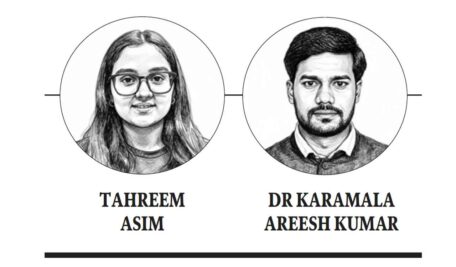Opinion: Gaza conflict—Starvation as a weapon of war
As crops are destroyed, aid blocked, and children starve, famine is being weaponised by Netanyahu’s government — while the world looks away

By Tahreem Asim, Dr Karamala Areesh Kumar
Mothers convincing their children to eat grass and civilians consuming endangered sea turtles despite the risk of poisoning — this is nothing but a crime against humanity. Yet leaders like Benjamin Netanyahu face no consequences. Famine is not a new phenomenon, but today, famine is being weaponised in Gaza. It has become a systematic injustice born of politics, conflict, indifference, and brutality.
The first blockade of aid in Gaza was not imposed after October 7, 2023. Rather, it began in 2007 when Israel enforced blockades after Hamas took control of Palestine, devastating the economy. The United Nations warned Israel to lift the embargo, as Palestinians could not be isolated from the world in this manner.
On October 9, 2023, the Netanyahu government officially blocked food and water aid to Gaza following two days of intensified conflict. Since then, Palestinians have been facing severe shortages of food, water, and medical assistance. According to the United Nations’ World Food Programme, in Gaza, 39 per cent of the Palestinian population survives without food. Over 3 lakh children under five suffer from acute malnutrition, 15 per cent of nutrition treatment services are non-functional, and 5 lakh people live in famine-like conditions. A recent UN report states that 16 children under the age of 5 have died since mid-July 2025.
UN reports warn of acute malnutrition and food insecurity, yet global accountability remains absent, exposing humanitarian and political failures in addressing this crisis
Palestine has lost its self-sufficiency in feeding its population due to the relentless bombing and destruction of its lands. In September 2024, reports by the UN and the Food and Agriculture Organization (FAO) revealed that 10,183 hectares (67.6 per cent) of cropland in Gaza had been destroyed. Orchards and trees (71.2 per cent), field crops (67.1 per cent), and vegetables (58.5 per cent) were damaged. In Khan Younis, 61.5 per cent of croplands were destroyed, while in northern Gaza, the figure was 78.2 per cent.
According to the FAO, 95 per cent of cattle have died while only 43 per cent of sheep, 37 per cent of goats, and just 1 per cent of poultry remain. The air drops of aid have provided limited relief, as it was costly and insufficient to meet demand. The destruction of bakeries alongside the ongoing aid blockades, all these devastations have left children starving and acutely malnourished.
SDG and Global Accountability
The Zero Hunger agenda (SDG 2) aims to ensure nutritious, sufficient, and safe access to food for everyone; double the agricultural productivity; promote small-scale food producers; and encourage a sustainable food system by 2030. In Gaza, however, SDG 2 has not only failed but also operates in reverse order. Under Netanyahu’s leadership, there is no availability or access to food, local production is impossible, and malnutrition is widespread — showing how hunger is being weaponised in the ongoing conflict.
The WHO reports that the Integrated Food Security Phase Classification (IPC) indicates that the famine conditions have already unfolded in Gaza. UN data shows half a million people in Gaza are in IPC Phase 5 of the catastrophe, which is defined by starvation at the household level; although, the overall famine threshold has not been officially declared. The Phase 5 catastrophe includes depletion of coping mechanisms and a high risk of malnutrition and death due to hunger. The May 2025 IPC analysis predicted that by September 2025, Gaza would reach a catastrophic level of hunger crisis even after repeated UN alerts and warnings.
Food security, according to the FAO, is when the entire population consistently has access — financially and physically — to sufficient, safe, and nutritious food. In Gaza, this holds no significance. Civilians are denied access to aid, killed while collecting food, and forced to survive amid acute malnutrition.
Illegal Tactic
Deliberate starvation violates international humanitarian law. Article 54 of Additional Protocol I of the Geneva Conventions criminalises starvation. The UN Security Council also strongly condemns starvation as a tactic of warfare. Yet, the international forums continue to invite Netanyahu, even as accusations of brutal starvation of civilians mount.
According to Al Jazeera, in March 2025, Israel restricted all humanitarian aid to Gaza to pressure Hamas for a ceasefire. International NGOs reported that in 2024, Israel rejected 83 per cent of aid meant for Gaza, forcing people to flee their homes in search of food. The Gaza Humanitarian Foundation (GHF) was established in May 2025 by Israel and the US, with four distribution points to replace the 400 UN distribution points. However, the initiative remains a non-starter as they are few in number, unstable, and inaccessible to civilians. The Israeli Army also destroyed 1,000 life-saving food relief trucks, preventing them from reaching the starving population.
The Netanyahu government claims that there is ‘no famine in Gaza,’ dismissing the crisis as only issues with ‘access.’ Israeli officials, including Ambassador Danny Danon, have accused UN Humanitarian Chief Tom Fletcher and OCHA of obstructing aid and collaborating with Hamas, without any evidence. Both the UN and USAID deny these claims, affirming that aid operations remain relatively reliable. Instead, criminal gangs that are aligned with GHF and Israeli operations have been accused of blocking 50 per cent of aid requests, and perpetuating bureaucratic restrictions, looting, and violence along aid routes.
Empty Words
The deliberate starvation of Palestine under Netanyahu’s leadership starkly contradicts the Zero Hunger SDG and international law. Dismantling food security and the weaponising of food deprivation highlights how the international community’s commitment to human rights and sustainable development is being undermined.
The Israeli blockade and pushing the whole population into malnourishment prove that the zero-hunger strategy is just not working in Gaza. The Netanyahu government’s actions threaten the international commitment to human rights, dignity, and the SDGs. It is not just a humanitarian crisis but a moral and political failure that needs immediate global attention.
International strategies cannot succeed when a nation’s policy deliberately blocks access to food and other essential services. History will record this as an era of inhumanity and systemic denial of Palestinians’ basic rights.

(Tahreem Asim is Research Assistant, and Dr Karamala Areesh Kumar is Head, Department of International Relations, Peace and Public Policy, St Joseph’s University, Bengaluru)
Related News
-
Delhi courts Dhaka after BNP sweep, keeps close watch on ISI moves
9 mins ago -
Manjeera Pipeline Burst: Water restored in Manikonda within 24 Hours
10 mins ago -
Dark-web syndicates wage low-cost war on Indian judiciary
24 mins ago -
Andhra horror: Suspect in minor girl’s rape, murder found dead
1 hour ago -
Bandh observed in Kyathanpalli; heavy police deployment at Balka Suman’s residence
1 hour ago -
Four children suffer burns after drum filled with chemicals explode in Bengal’s Canning
1 hour ago -
PM Modi set to visit TN twice in March as NDA gears up for Assembly polls
1 hour ago -
Hyderabad: Christians observe Ash Wednesday with solemn masses
1 hour ago




